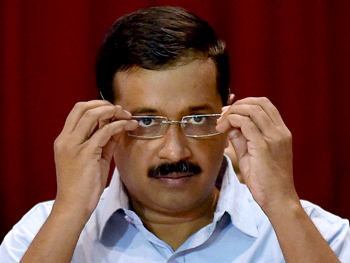New Delhi, Jun 20: Chief Minister Arvind Kejriwal today demanded that BJP MP from East Delhi Mahesh Giri be arrested in connection with the murder of NDMC official M M Khan even as he accused the Prime Minister of "shielding" him.

The BJP MP had asked Kejriwal to either prove his charge against him or "resign" from the post of Chief Minister.
In a tweet, Kejriwal demanded that Giri should be arrested. "He shud be arrested n interrogated by Modi police in MM Khan murder case. Modi police shielding him," he said.
Kejriwal, in a letter to Lieutenant Governor Najeeb Jung, had accused him of trying to "save" Giri and New Delhi Municipal Council (NDMC) vice-chairman Karan Singh Tanwar in Khan's murder.
Giri had asked Kejriwal for a public debate over his allegations. In a letter to Kejriwal on June 16, Giri had invited him to Constitution Club to produce "evidence" he had against him in the M M Khan murder case on Sunday 4 PM.
Kejriwal did not accept the challenge following which Giri, accompanied by his party supporters, reached the Chief Minister's flagstaff Road residence and sat on hunger strike.
Khan, an estate officer of NDMC, was shot dead in Jamia Nagar on May 16, a day before he was scheduled to pass the final order on the lease terms of a hotel which was functioning on a property leased out by the civic body.







Comments
Frustration clearly visible from frrustrated souls from one particular community ... hahahaha ... chanakya rightly said \ when powerful leader rules the nation , common man will be peaceful and law abiding .. people who are basicaly anti national , tied up with enemy states, criminals , roberers , theives will be highly frustrated ...\" ...this chap along with one section has modi phobia ... they call our powerful leader as Feku ... where as we know what is his strength ... with just his call , 1crore 30 Lakhs gas connections were returned ... it is the power of powerfull leader ... FDI almost 55 BILLION USD ...in just few months ... india will start exporting missiles ... we are seeing massive Infrasture development which is truly visible even in non BJP ruled states like karnataka ... hara hara modi .. jai jai modi .."
Modi police not only shielded GIRI but also all the RSS terrorists.
Add new comment